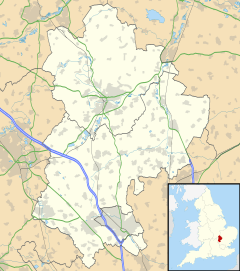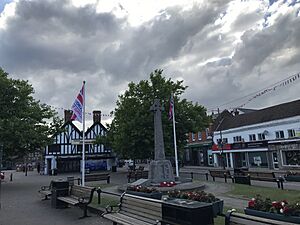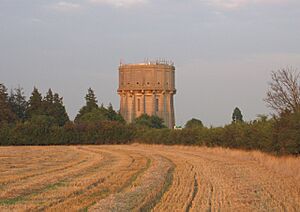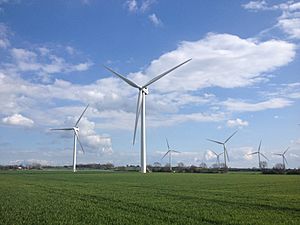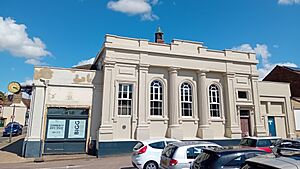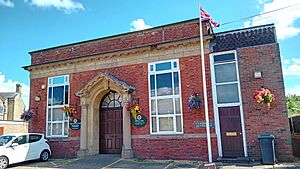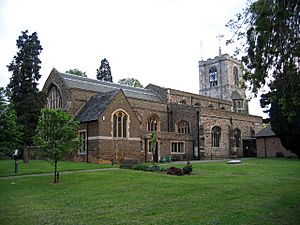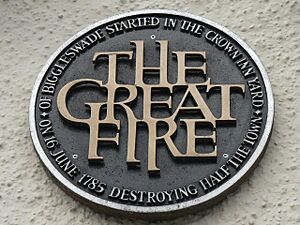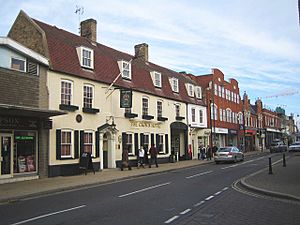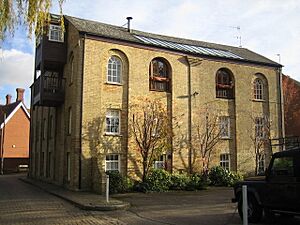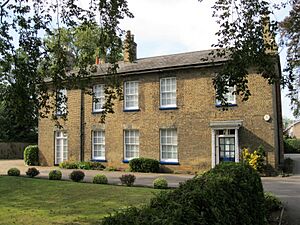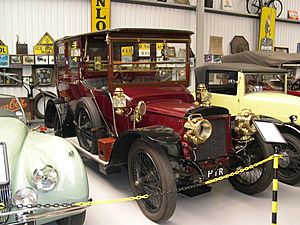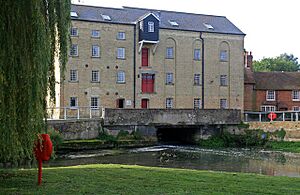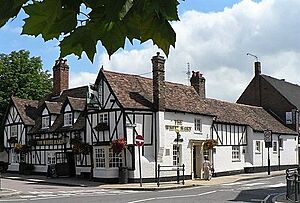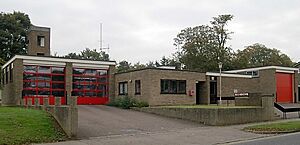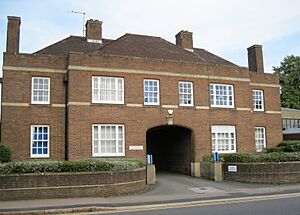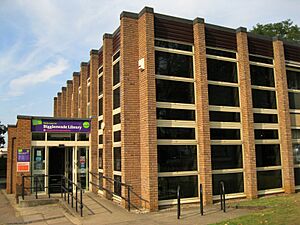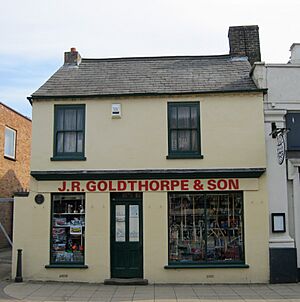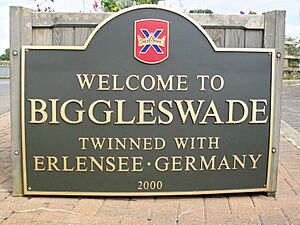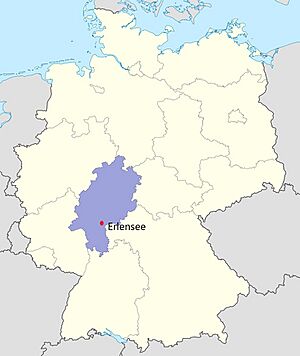Biggleswade facts for kids
Quick facts for kids Biggleswade |
|
|---|---|
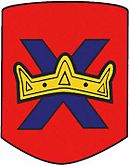 Town council logo and unofficial town arms |
|
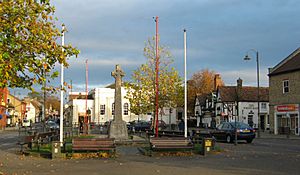 Biggleswade town centre |
|
| Population | 22,541 (2021 Census) |
| OS grid reference | TL1944 |
| Civil parish |
|
| Unitary authority | |
| Ceremonial county | |
| Region | |
| Country | England |
| Sovereign state | United Kingdom |
| Post town | BIGGLESWADE |
| Postcode district | SG18 |
| Dialling code | 01767 |
| Police | Bedfordshire |
| Fire | Bedfordshire and Luton |
| Ambulance | East of England |
| EU Parliament | East of England |
| UK Parliament |
|
Biggleswade (/ˈbɪɡəlzweɪd/ big-ƏLZ-wayd) is a lively market town and civil parish in Central Bedfordshire, England. It is located in the county of Bedfordshire. The town sits by the River Ivel, about 11 miles (18 km) south-east of Bedford. In 2021, its population was 22,541, showing a big increase from 16,551 in 2011.
People have lived in the Biggleswade area since the Neolithic period (New Stone Age). However, the town itself likely started with the Anglo-Saxons. A rare gold Anglo-Saxon coin was found near the River Ivel in 2001. The British Museum bought it in 2006, and it was the most expensive British coin ever bought at that time.
King John allowed Biggleswade to hold a market in the 13th century. In 1785, a huge fire destroyed a large part of the town. The famous Great North Road used to pass through Biggleswade until a new bypass was built in 1961. A railway station opened in 1850. From the 1930s to the late 1990s, many people worked in factories here. The town centre is now a special conservation area.
Contents
- Where is Biggleswade Located?
- How Biggleswade is Governed
- A Look Back at Biggleswade's History
- Who Lives in Biggleswade?
- What Kind of Jobs are There?
- Learning in Biggleswade
- Hotels, Inns, and Pubs
- News and Media
- Public Services
- Getting Around Biggleswade
- Places of Worship
- Shopping in Biggleswade
- Sports and Fun Activities
- Town Events and Connections
- Future Plans
- Famous People from Biggleswade
- Fun Places to Visit Nearby
- See also
Where is Biggleswade Located?
Biggleswade is about 40 miles (60 km) north of Central London. It is also about 20 miles (30 km) west-south-west of Cambridge. The nearby small village of Holme is part of Biggleswade's local area.
From Biggleswade station, trains can reach London in about 45 minutes. The A1, a major road in Britain, goes around the town. The old road through the town is now called the A6001. Other roads connect Biggleswade to nearby towns like Potton and Langford.
How High is Biggleswade?
The centre of Biggleswade is about 28 m (92 ft) above sea level. The land rises to 78 m (256 ft) at the southern edge of the town, near the water tower on Topler's Hill.
What is the Soil Like?
The soil in the area is mostly sandy and drains water well. It is also rich in nutrients, which is good for farming. The ground beneath the River Ivel valley is made of river gravel. The town centre itself sits on this gravel, along with some sand and sandstone.
What Does the Landscape Look Like?
Biggleswade Common is a large area of grassland. It stretches along the eastern side of the River Ivel. This common land is about 300 acres (120 ha) and is the biggest in Bedfordshire. It has rich, peaty soil and is used for grazing horses and cattle.
To the south of the town, you can see a wind farm with ten turbines. There is also a solar power farm north of Shortmead House.
The River Ivel
The Environment Agency checks the water level of the River Ivel in Biggleswade. Usually, the river level is between 0.12 m (5 in) and 0.27 m (11 in). The highest level ever recorded was 1.14 m (3 ft 9 in) on 11 February 2009.
How Biggleswade is Governed
For a long time, Biggleswade was part of an area called a "Hundred" in Anglo-Saxon times. Later, from 1892, it had its own local council called the Biggleswade Urban District. This council met at Biggleswade Town Hall. In 1974, this council was replaced by the Mid Bedfordshire District Council. Then, in 2009, a new council called Central Bedfordshire Unitary Authority took over most of the local government duties.
Biggleswade Town Council
The Biggleswade Town Council handles many local services. These include:
- Looking after car parks.
- Managing allotment gardens (small plots of land for growing food).
- Taking care of cemeteries.
- Maintaining play areas and recreation spots.
- Running the Orchard Community Centre.
The Town Council also reviews plans for new buildings and can share its opinions with the Central Bedfordshire Council.
Biggleswade is divided into three areas for elections: Ivel, Holme, and Stratton. Voters in each area choose five councillors every four years. These councillors then choose a Town Mayor each year. The Town Council gets its money from a local tax called a "precept."
Central Bedfordshire Council
The Central Bedfordshire Council is responsible for bigger services in Biggleswade. These include:
- Social care homes.
- The public library.
- Roads and rubbish collection.
- The Saxon Pool and Leisure Centre.
- Most schools (not academies).
- Planning for larger developments.
Five councillors are elected to represent Biggleswade on the Central Bedfordshire Council.
UK Parliament
Biggleswade used to have its own Member of Parliament (MP). Now, it is part of the North Bedfordshire area. The current MP is Richard Fuller from the Conservative Party.
A Look Back at Biggleswade's History
People think the area around Biggleswade has been lived in since about 10,000 BC. Old Arrowheads have been found from this time. Pottery from the late Neolithic period has also been discovered.
In 2001, archaeologists found a pit from the late Bronze Age. They also found Iron Age pottery and grains of wheat and barley.
During Roman times, a road called the White Way likely passed through Biggleswade. There is also evidence of a possible Roman temple near Biggleswade Common.
Anglo-Saxons in Biggleswade
In the 5th century AD, Saxon people came and settled here. The name Biggleswade might come from "Biceil," an Anglo-Saxon name, and "Waed," which means "ford" (a shallow place to cross a river). Old spellings of the name include Bykeleswad and Bickleswade.
Wells and pits from the early 7th century have been found in the Stratton area. There is also evidence of an Anglo-Saxon castle discovered from old aerial photos.
In 2001, a gold coin with the name Coenwulf was found by the River Ivel. This rare coin was made in London. It was sold for a lot of money, and the British Museum bought it in 2006. It was the most expensive British coin bought at that time!
Medieval Times
Biggleswade parish used to have three main settlements: Biggleswade, Holme, and Stratton.
Biggleswade is mentioned in the Domesday Book, a famous survey from 1086. It notes that Biggleswade had two mills. By 1309, Biggleswade had grown larger than Stratton.
In 1132, King Henry I gave the land of Biggleswade to the Bishop of Lincoln. King John later gave Biggleswade the right to hold a market. The old Church of St Andrew has a special brass monument showing a figure of Death.
The Great Fire of 1785
On 16 June 1785, a fire began at the Crown Inn. It quickly spread and destroyed almost one-third of the town. People from all over the country helped raise money for the 332 people who lost their homes and jobs.
The Great Fire is shown in a beautiful stained-glass window in St Andrew's Church.
How Transport Developed
A bridge carrying the Great North Road over the River Ivel was first mentioned in the 13th century. In 1796, the old stone bridge was rebuilt. A new metal bridge was added in 1939. The town got a bypass in 1961, and the current bridge was built in 1999.
The River Ivel was made easier to travel on by boats in 1758. This helped transport wood and coal. However, the canal was closed in 1876.
In the 19th century, Biggleswade was an important stop for horse-drawn coaches. They travelled to places like London and York.
The Great Northern Railway opened a station in 1850. This made travel much faster.
Bus services started in the town with companies like Eastern National. Today, several bus companies serve Biggleswade and connect it to nearby towns.
Workhouses
From around 1780, Brigham House was used as a workhouse for the poor. A larger workhouse was built on London Road in 1836. This building later became an old people's home and was taken down in 1972.
Farming and Factories
In 1868, Biggleswade was known for its fertile land and for people working in farming and market gardening. Many women also made lace and straw-plait. Today, Bedfordshire Growers still supplies potatoes and onions to supermarkets.
Samuel Wells started a brewery in 1764. A new brewery was built in 1901, but it closed in 1997. An Asda supermarket is now on that site.
From 1862, a company called Maythorn made coaches and car bodies. After it closed, the factory was used by different companies, including one that made heat-insulation for aircraft like Concorde.
The Ivel Cycle Works, started by Dan Albone in 1881, made bicycles, motorbikes, and early tractors.
Holme Mills, mentioned in the Domesday Book, has been home to Jordans Cereals since 1893. Other factories in Biggleswade made things like photographic film, lingerie, precision machines, and pet food. Many of these factories have now closed, and their sites are used for housing or shops.
Cinema History
The Empire Cinema (originally The Cinema Palace) was open from 1913 to 1958. It was later used as a factory and then replaced by houses. The Regal Cinema, which opened in 1936, closed in 1976 and became a bingo hall.
Who Lives in Biggleswade?
| Population growth in Biggleswade since 1801 | ||
|---|---|---|
| Year | Pop. | ±% |
| 1801 | 1,794 | — |
| 1841 | 3,807 | +112.2% |
| 1881 | 4,947 | +29.9% |
| 1921 | 5,395 | +9.1% |
| 1961 | 8,050 | +49.2% |
| 2001 | 15,383 | +91.1% |
| Source: A Vision of Britain through Time | ||
In 2011, Biggleswade had a population of 16,551 people. Most residents (93.4%) were born in the United Kingdom. About 91.8% of people were white British.
When it comes to religion, 59.9% said they were Christian. About 1.9% followed other religions, and 38.2% said they had no religion or did not say.
What Kind of Jobs are There?
In 2011, the biggest job areas for people in Biggleswade were:
- Shops, car repairs, and wholesale (18%).
- Manufacturing (making things in factories) (13%).
- Construction (building things) (10%).
- Healthcare and social work (10%).
- Education (9%).
The unemployment rate in Biggleswade was 3.5%, which was lower than the average for England (4.4%).
A large Co-op Food Group warehouse opened in May 2022. It helps distribute food to many stores.
Learning in Biggleswade
Biggleswade has a three-tier education system. This means:
- Lower schools are for ages 5–9.
- Middle schools are for ages 9–13.
- Stratton Upper School is for 13–16 year olds and also has a sixth form for older students.
Stratton Upper School and Community College opened in 1950. It became an Academy in 2012. It has over 600 students aged 13–16 and nearly 400 in the sixth form.
Biggleswade Academy started in 2012. It brought together Holmemead Middle, Southlands Lower, and Brigham Pre-School.
There are also two Church of England (C of E) schools:
- Edward Peake C of E (VC) Middle School, named after a person who helped educate children in the 16th century.
- St Andrew's C of E (VC) Lower School, which opened in 1988 and has a second site opened in 2015.
Lawnside Academy is for pupils aged 4–9 years. It opened in 1959.
Ivel Valley School helps children with learning difficulties. OneSchool Global, Biggleswade Campus, opened in 2014 and is linked to the Plymouth Brethren.
Hotels, Inns, and Pubs
Biggleswade used to have many inns and pubs because it was on the Great North Road. In 1876, there were 52! By 2019, only nine remained, plus one new one.
The Crown Hotel was rebuilt in 1793 after the Great Fire. It reopened in 2017. The White Hart is a very old building, thought to be the second oldest in town after St Andrew's Church. The King's Reach pub opened in 2018.
News and Media
The Biggleswade Chronicle is the local newspaper, published every Friday. It started in 1891. Charles Elphick owned and edited it for almost 50 years. The paper is now owned by National World.
For local news and TV, people in Biggleswade watch BBC East and ITV Anglia. TV signals come from the Sandy Heath TV transmitter.
Local radio stations include BBC Three Counties Radio and Heart East. BigglesFM is a local community radio station that started broadcasting in 2011.
Public Services
Anglian Water supplies water to Biggleswade. The water is treated and is considered "hard." There is also a waste water treatment plant nearby.
UK Power Networks provides electricity, and Cadent Gas manages the gas supply.
The closest hospitals are Bedford and Lister Hospital, Stevenage. Mental health services are provided at Biggleswade Hospital. There are also local doctors' surgeries.
Ambulance services are provided by the East of England Ambulance Service. Biggleswade has a Bedfordshire Fire and Rescue Service station with local firefighters. St John Ambulance also has a unit here.
Bedfordshire Police has a station in Station Road.
Biggleswade has a modern public library in Chestnut Avenue, which opened in 1968.
There is a main post office in Bonds Lane and another one in Stratton Way. Royal Mail has a delivery office in Station Road.
Getting Around Biggleswade
Bus Services
Herberts Travel runs a local bus service around the town. They also have services to nearby towns like Sandy and Potton. Stagecoach East runs services to Sandy and Bedford. Grant Palmer operates routes to Hitchin and Shefford.
There are no bus services on Sundays or public holidays.
Some community bus services, like Whitbread Wanderbus and Ivel Sprinter, also run weekly services to places like St Neots and Cambridge.
Train Services
Thameslink trains run every half hour from Biggleswade. They go through London to Horsham, stopping at major stations like St Pancras and London Bridge. The fastest journey to London takes about 30 minutes.
Great Northern runs extra trains to Kings Cross during busy times. On weekends, all services end at Kings Cross. Trains going north from Biggleswade go to Peterborough in about 40 minutes.
Places of Worship
Biggleswade has several churches that work together as "Churches Together." These include:
- St Andrew's (Anglican).
- Trinity (Methodist).
- St Peter's (Catholic).
- Biggleswade Baptists.
- Healing Hour.
- Newlife Church.
- Pentecostal Church.
Biggleswade Cemetery also has a chapel. The Plymouth Brethren have a Gospel Hall, and Jehovah's Witnesses have a Kingdom Hall.
An old Church of St John the Baptist was taken down in 1975. A Primitive Methodist Chapel from 1873 still stands but is no longer used for worship.
Shopping in Biggleswade
The main shopping streets are Market Place, High Street, and Hitchin Street. A market is held every Saturday, and a smaller one on Tuesdays.
J. R. Goldthorpe & Son, a hardware store, is thought to be the oldest shop in Biggleswade, starting in 1869.
Biggleswade has several large supermarkets:
- A Sainsbury's supermarket opened in 1994.
- An ASDA store opened in 2005.
- There is also an Aldi and an Iceland store.
The A1 Retail Park, a large shopping area, started being built in 2013. It has big stores like Homebase, Marks and Spencer, Matalan, Boots, and Wilko.
Sports and Fun Activities
Biggleswade has three football clubs:
- Biggleswade Town
- Biggleswade FC
- Biggleswade United (whose chairman is Sky Sports expert Guillem Balague).
Biggleswade also has a cricket club and a rugby club.
At Drove Road Recreation Ground, you can find the Biggleswade Town Bowls Club and free tennis courts.
For golf, there's the John O'Gaunt Golf Club with two courses, and the Biggleswade Golf Centre driving range.
The Saxon Pool and Leisure Centre offers swimming and gym facilities. It also has a sports hall and a skate park.
The Franklin Recreation Ground is by the River Ivel. You can enjoy walking and cycling on the Biggleswade Green Wheel route, and the Kingfisher Way walk also passes nearby.
Town Events and Connections
Town Carnival
The Biggleswade carnival has been held every June since 1957. It first started to raise money for a public swimming pool, which opened in 1968. Now, the money raised helps local groups, sports clubs, schools, and charities.
Each year, a Carnival Court is chosen, including a Queen, Princess, and Prince. The main event is a parade of decorated floats through the town. There is also a funfair during carnival week.
Twin Town
To celebrate this, there is an "Erlensee Way" in Biggleswade and a "Biggleswade Strasse" in Erlensee.
Future Plans
In 2019, plans were approved for a new village with 1,500 homes to be built east of the King's Reach area.
Famous People from Biggleswade
Many interesting people have connections to Biggleswade:
- John Manton, a Methodist minister who started a college in Australia, was born here.
- Henry Ryland, a famous painter, was also born in Biggleswade.
- Dan Albone, an inventor and cyclist, who created one of the first practical farm tractors, lived and worked in the town.
- Charles Penrose, a radio comedian known for "The Laughing Policeman" song, was born here.
- Children's author Christine Chaundler and science fiction writer Philip E. High are also from Biggleswade.
- Ian Mantle, a vehicle engineer and rally driver, grew up in the town.
- Derek Scott, the music director for The Muppet Show, was born here.
- British Olympic rower William Windham is from Biggleswade.
Other notable residents include:
- Richard Walker, a famous fishing journalist and author, lived by the River Ivel.
- Pam Rhodes, a novelist and BBC Songs of Praise presenter, runs a cattery in town.
- Peter Kendall, a former chairman of the National Farmers' Union, farms land in Biggleswade.
- Louisa Mary Cresswell, known as the "Lady Farmer," was born here in 1830.
- Mary Tealby (1801–1865), who started the famous Battersea Dogs' Home, is buried in St Andrew's churchyard.
- Janet Millett, an author who wrote about life in Western Australia in the 1860s, lived in Biggleswade.
- Wally Odell, a former footballer, was born in the town.
- Stevie Vincent of the music group The Adventures of Stevie V is from Biggleswade.
- Reginald Ward, a cricketer, was born at Biggleswade.
Fun Places to Visit Nearby
- Jordans Mill, where Jordans cereals come from.
- Old Warden Aerodrome, home to the Shuttleworth Collection of old airplanes.
- The Swiss Garden in Old Warden Park.
- The Lodge RSPB reserve, a nature reserve for birds.
See also
 In Spanish: Biggleswade para niños
In Spanish: Biggleswade para niños
 | James Van Der Zee |
 | Alma Thomas |
 | Ellis Wilson |
 | Margaret Taylor-Burroughs |


